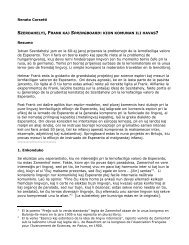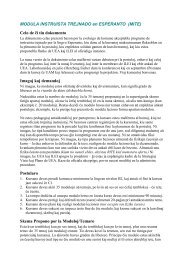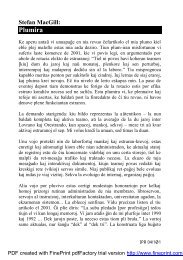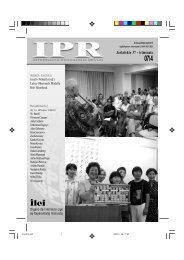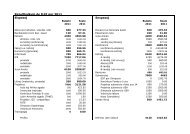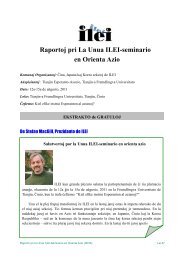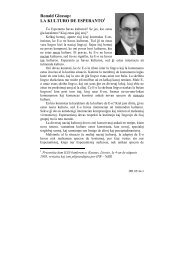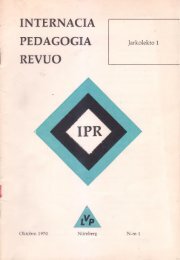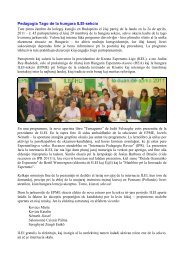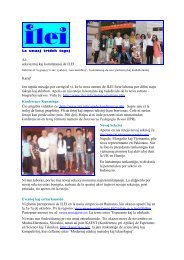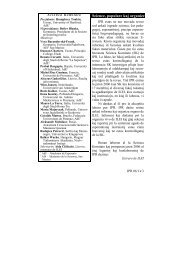Prof. Humphrey Tonkin University of Hartford, USA tonkin ... - ILEI
Prof. Humphrey Tonkin University of Hartford, USA tonkin ... - ILEI
Prof. Humphrey Tonkin University of Hartford, USA tonkin ... - ILEI
You also want an ePaper? Increase the reach of your titles
YUMPU automatically turns print PDFs into web optimized ePapers that Google loves.
2<br />
between the marginalization <strong>of</strong> their message and the marginalization <strong>of</strong> their language, they<br />
choose the latter. As a result, the process speeds up and French loses ground, primarily to<br />
English, all the faster.<br />
We may argue that this textbook case <strong>of</strong> language shift is essentially an unequal battle<br />
between two languages. The inequality springs in part from the behavior <strong>of</strong> non-native<br />
speakers <strong>of</strong> French and English, who, faced with a choice, are increasingly choosing to invest<br />
in the learning <strong>of</strong> English rather than French. These two languages, traditionally recognized<br />
as the principal lingua francas <strong>of</strong> international discourse, at least in the west, have been<br />
shifting relative positions for the past hundred years or more, as the economic power <strong>of</strong> the<br />
United States has eclipsed that <strong>of</strong> France and as economic activity has become increasingly<br />
internationalized. Thus English has established itself as the primary language <strong>of</strong><br />
international communication and French is rapidly shifting from international currency to<br />
become the national language <strong>of</strong> a nevertheless economically powerful international player<br />
with a rather fragile francophone network that includes French-speaking Canada, so-called<br />
francophone Africa, and various other foci <strong>of</strong> French influence.<br />
On the other side <strong>of</strong> this trade-<strong>of</strong>f are the English speakers. They come in several different<br />
categories. There are at the core the native speakers <strong>of</strong> English. Around them are grouped a<br />
considerably larger number <strong>of</strong> highly competent non-native speakers, some <strong>of</strong> them in parts<br />
<strong>of</strong> the world heavily influenced or formerly dominated politically by Britain or the United<br />
States (anglophone Africa, India, Israel, the Philippines), some <strong>of</strong> them members <strong>of</strong> an<br />
international elite that includes speakers from all parts <strong>of</strong> the world who use English on a<br />
regular basis as one <strong>of</strong> their repertoire <strong>of</strong> languages and who may have studied or lived in the<br />
United States or another English-speaking country. This large group <strong>of</strong> non-native speakers,<br />
now larger in number than native-speakers, can be expected to have a larger and larger<br />
influence on the linguistic development <strong>of</strong> English.<br />
Around this second group is a third less clearly defined group <strong>of</strong> individuals who use English<br />
in a relatively restricted context, or are non-elite members <strong>of</strong> communities where English is<br />
used in some measure as a lingua franca (India, for example). Finally, and beyond them<br />
again, are those learning English, partly in informal settings, but particularly in schools all<br />
across the world. The only countries in the world where English is not a major item <strong>of</strong><br />
instruction in the schools are English-speaking countries (though one might add<br />
parenthetically that in-migration into those countries is producing a rather different<br />
population <strong>of</strong> young people whose English-language needs must be addressed through the<br />
education system). Non-English-speaking countries must invest heavily in English-language<br />
learning in order to remain competitive, and this puts a significant burden, both in financial<br />
terms and in the school day, on schools in these countries. This is time and money that<br />
<strong>of</strong>ten governments can ill afford because economic conditions already disadvantage them in<br />
comparison to the educational investment in Britain or the United States. The process <strong>of</strong><br />
English acquisition is hastened by the avalanche <strong>of</strong> English-language-based cultural products<br />
– films, television programming, videogames, music, books – available throughout the world<br />
in increasingly open markets, and by the expanding network <strong>of</strong> the Internet. The existence<br />
<strong>of</strong> these cultural products creates a strong incentive to master English, which makes the task<br />
<strong>of</strong> language teachers easier, and enhances the likely results <strong>of</strong> their labors.<br />
Under such circumstances, there is precious little need for the average native English speaker<br />
engaged in average international activities to acquire any other languages at all. Indeed, in a<br />
situation in which speakers <strong>of</strong> other languages are accommodating to the use <strong>of</strong> English in



